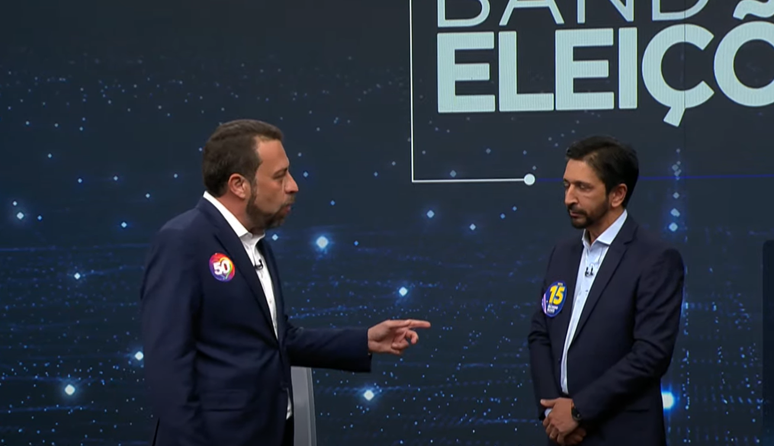Faced with a three-day crisis in the city, the “management” abandoned the announcements and speeches and entered the discussion.
The first debate of the return round in Sao Paulo had tensions, clashes, attacks and even a bit of détente. Nothing compared to the scenes of ferocity that marked the first round and the base provocations. Although there were predictable and already covered topics so far, what guided the discussion between Ricardo Nunes (MDB) and Guilherme Boulos (Psol) at the Band were two related and current topics: “management” and “blackout”.
It was the best debate of the race in terms of discussion of proposals and comparison of ideas, of face-to-face questions, with speaking times that could be managed as each candidate saw fit. Mainly because we were in the midst of a problem that appeared (or rather, reappeared) in the city three days ago after a storm. This brought an issue to the lips of the two speakers.
The program covered various topics, the godfathers Lula (PT) and Jair Bolsonaro (PL), the investigations into excessive prices in municipal contracts, public safety in the city, medicines and health interventions. But the real problem, as Band’s network mapping showed, was the blackout. Until shortly before the debate, the lack of energy was felt absurdly in 338 thousand properties that had remained dark since Friday the 11th.
This is where “management” comes in. The idea of management, of being an administrator and administrator of the city, has been one of the focuses of Ricardo Nunes’ campaign since the first round, strengthened in this second phase. The counterpoint is directed at Boulos’ lack of experience in management positions. However, lack of energy issues call Nunes’ ability into question. In Brazil it is common for the problem of public management to always fall on the closest politician, usually the mayor.
The topic is met with technical terms and a lot of legal language, nothing that will interest those who are unaware of losing food or suffering losses with their business, their children’s school, etc. Faced with this scenario, Nunes showed what he did and passed the complaint to the Lula government, since the concession is federal. In one of the interventions in his defense he made a mistake that bothers any citizen waiting for urgent responses from the public authorities: he read the articles of the concession contract to say that, look, it’s not my fault.
Anyone who has ever encountered a poor-quality public service knows how much their blood boils when they see their problem justified by bureaucracy, by an employee who reads any paperwork to say it won’t solve anything. This is how the mayor’s speech sounded.
With a broad command of the stage and speech, Boulos led the debate. At times the mayor seemed touched by the crisis afflicting the city and even on the stage he was empty.
Nunes refused to commit to his opponent to reveal his bank details, did not comment on the old speech of his deputy, former Rota commander, Melo Araújo (PL), about taking different approaches uptown and in the suburbs and it wouldn’t even be advisable for someone to walk around peacefully with their cell phone on the streets of São Paulo.
In the two blocks in which each of the candidates had 20 minutes to debate freely, the psolist responded to Nunes’ interventions, always answering with a question. In his responses, Nunes oscillated between responding at times, giving his opponent a jab and justifying his handling. He lacked the ability to make Boulos uncomfortable and isolate him.
The mild tone and avoidance of controversial topics is a strategy that gives Nunes some comfort precisely because of Boulos’s high rejection rate, around 58%, according to Datafolha. The big difference of the evening was precisely the blackout, because it tested the mayor’s management and ability to manage and overcome crises, to show service, competence and… management.
The tone of the debate went along these lines and with one point in common, both agreeing on the poor quality of the service provided by Enel, the Italian company responsible for the electricity concession. But as we know, it’s not just the debate that matters, but also what will be said about it and what the voter will think about it.
Does Nunes’ handling of this crisis satisfy voters? And is Boulos’ rejection so great that voters prefer Nunes rather than opt for a change? These are the questions that remain in the end.
Source: Terra
Rose James is a Gossipify movie and series reviewer known for her in-depth analysis and unique perspective on the latest releases. With a background in film studies, she provides engaging and informative reviews, and keeps readers up to date with industry trends and emerging talents.



![Everything starts here: what awaits you in the episode 1248, Monday, August 25, 2025 [SPOILERS] Everything starts here: what awaits you in the episode 1248, Monday, August 25, 2025 [SPOILERS]](https://fr.web.img2.acsta.net/img/0f/1a/0f1a619b2425b5951ac206e844d5be85.jpg)
![Tomorrow belongs to us: What awaits you in the 2016 episode, Monday, August 25, 2025 [SPOILERS] Tomorrow belongs to us: What awaits you in the 2016 episode, Monday, August 25, 2025 [SPOILERS]](https://fr.web.img3.acsta.net/img/6b/95/6b955784241a5864d610363e958b2c39.jpg)

